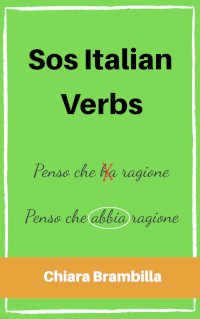
Italian verb tenses are one of the areas where learners struggle the most. One of the main difficulty is talking about the past correctly in Italian.
Indeed, in Italian there are many verbs that can be used to refer to the past. Two of the most used verbs in standard Italian to talk about the past are passato prossimo and the imperfect.
I already explained how to form passato prossimo and when and how to use it in another article: Learn the Italian past tense passato prossimo.
In this article, instead, I’ll focus on the imperfect tense.
Imperfect
Imperfect is an Italian verb tense that is used for many different functions. Let’s see them together.
1. Imperfect tense is used to indicate a fact happened in the past.
Ex:
Mio fratello aveva un gatto, tanti anni fa
My brother used to have a cat many years ago
2. Imperfect tense is also used to talk about a past action that was carried out as a habit
Ex:
Da bambina andavo sempre al parco col mio papà
When I was a child I always went to the park with my daddy
3. Imperfect tense is used to indicate an action that you were carrying out while another action happened
Ex:
Guardavo la televisione, quando qualcuno bussò alla porta
I was watching television, when someone knocked at the door

Do you want to master all the Italian verb tenses? Have a look at my book Sos Italian verbs.
4. Imperfect tense is also used to make a request in a gentle way
Ex:
Volevo tre bistecche di tacchino
I wanted three turkey steaks
5. Imperfect tense is used to describe characteristics of people, places or objects
Ex:
Era una donna interessante. Aveva lunghi capelli neri e occhi verdi, e sorrideva sempre
She was an interesting woman. She had long black hair and green eyes, and she always smiled
6. Imperfetto is used after a past tense
Ex:
L’ho visto mentre correva via
I saw him while he was running away
7. Finally, Imperfect tense is used informally to express a condition and a consequence
Ex:
Se mi telefonavi, venivo subito
If you called me I would have come immediately
Formation
The formation of imperfect changes according to the type of verb – regular or irregular.
REGULAR VERBS
To form imperfect of regular verbs, you just replace the infinitive verb ending (-are, -ere, -ire) with one of the followings:
| -ARE | -ERE | -IRE | |
| Io | -avo | -evo | -ivo |
| Tu | -avi | -evi | -ivi |
| Lui/Lei | -ava | -eva | -iva |
| Noi | -avamo | -evamo | -ivamo |
| Voi | -avate | -evate | -ivate |
| Loro | -avano | -evano | -ivano |
Examples:
He cooked
Cucinare -> cucinare -> Lui cucinava
We had
Avere -> avere -> Noi avevamo
I slept
Dormire -> dormire -> Io dormivo
IRREGULAR VERBS
For irregular verbs there are no formation rules and they have to be learnt by heart.
Some examples are: essere (ero, eri, era, eravamo, eravate, erano), dire (dicevo, dicevi, diceva, dicevamo, dicevate, dicevano), fare (facevo, facevi, faceva, facevamo, facevate, facevano), dare (davo, davi, dava, davamo, davate, davano).
Can you talk about the past easily in Italian? Are you struggling with some topic? Drop me a line and I’ll write an article or I’ll make a video about it.
If you need to master or revise basic Italian grammar, have a look at my book Sos Italian grammar A1-A2.
Credits
Original photo by Alexas_Fotos






I am learning italian in my spare time as a hobby and I found this site extremely
helpful. Thank you
GRazie, sono molto felice di sentirlo, Brian! – Thanks, I’m so happy to hear this Brian!